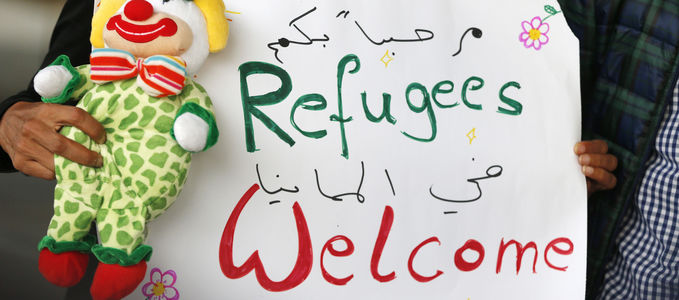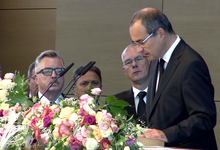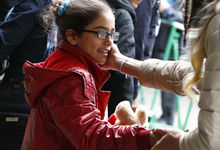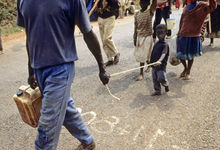Help for helpers
Would I like to help out? Gladly! But how? Questions like this have been coming up again and again—even in New Apostolic congregations—with regard to the influx of refugees to Europe. The Church's leadership has not merely contented itself with launching appeals, but is also offering help to the helpers.

Various District Apostles have already turned to the congregations and districts in their care through letters. The letters also contain specific suggestions as to how interested parties can become involved in refugee aid and what things they need to look out for. The most comprehensive guideline has been made available in Southern Germany. The guide entitled "Basic instructions for volunteers on how to help refugees" was developed in collaboration by eight regional "Humanitarian aid officers", most of whom have a background in the social or medical fields.
Irrespective of religion or background
The common maxim of all the letters is care for other human beings—without reservations. After all, our Catechism states (chapter 13.5.3): "The New Apostolic Church is committed to the gospel and the imperatives of Christian ethics. Thus it understands its duty to include charitable activity which benefits people irrespective of gender, age, colour, nationality, or religion" (chapter 13.5.3).
Refugees are to experience the help of the members in a corresponding manner and feel that they are welcome regardless of their background or religion. Such is the unanimous thrust of the letters. After all, the letters point out, these individuals have come to Germany from war-torn countries in crisis just to survive.
Working along within a proven structure
Much like their colleagues in ministry, District Apostles Rainer Storck (North Rhine-Westphalia) and Michael Ehrich (Southern Germany) encourage anyone who would like to get involved to contact community or religious aid organizations such as Caritas and Diakonie, or other initiatives organized by local work groups. It may also be advisable to contact community authorities in order to gain a better idea of the available opportunities for providing support.
There are good reasons for proceeding this way: these organizations have significant experience in coordination, are aware of the specific needs, and can also engage helpers in a more targeted manner, in accordance with their strengths. In addition, these organizations provide professional training and help as well as backing and support in the event of any problems that may arise.
Contacts allow for exchange
Beyond providing donations and practical support, it is also important to create a "welcoming culture" in the local congregations, emphasizes District Apostle Rüdiger Krause, for example. The Southern German guide lists opportunities such as invitations to casual gatherings or leisure activities, offers to help with homework, arranging team sports, or even offers to come along to doctor's appointments or other errands.
Such contacts allow us to become better acquainted and exchange thoughts in dialogue. However, in so doing, helpers must also be aware of the cultural differences. What is called for here is a respectful attitude toward the unfamiliar, as well as a solid awareness of one's own values, but above all, composure and curiosity.
Commitment with limits
Personal commitment must also have its limits, as the "Humanitarian aid officers" clearly explain: many refugees come from war zones and are traumatized. Professional therapists are the right source of help for them. The approval procedure lies in the hands of the authorities and is not to be influenced. Beyond that, helpers are also to be aware of the limits of their own capacity to help.
And finally, this kind of care is not to be misconstrued as missionary work, but should remain a service born of love for one's neighbour. To support this, District Apostles Wolfgang Nadolny (Berlin-Brandenburg) and Wilfried Klingler (Central Germany) both reference the same Bible passages from Matthew 25: 35-40: "I was a stranger and you took Me in," and "Inasmuch as you did it to one of the least of these My brethren, you did it to Me."
Photo: Hannibal Hanschke / Reuters
Article info
Author:
Date:
Keywords:
Andreas Rother
17.09.2015
Germany,
Aid agencies,
Congregational life








